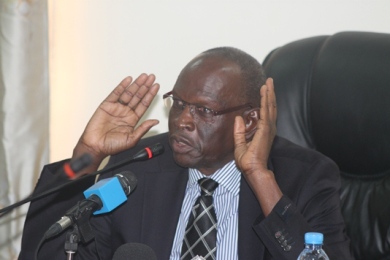S. Sudan’s Central Bank declines to handle letters of credit
June 11, 2015 (JUBA) – The governor of South Sudan’s Central Bank, Kornelio Koriom, has advised the country’s lawmakers against returning the management of letters of credit under the bank’s authority, saying the beneficiaries threaten to “kill” if not awarded.

“Everybody who has never gone out of this country wants the LCs [the letters of credit] and want to be an importer,” the governor told lawmakers on Tuesday.
“But not every trader can be an importer. Even he who doesn’t know the A, B, C of the foreign trade will almost kill you if you say no. So it is not an easy thing,” he added.
A parliamentary investigation presented to the country’s lawmakers showed discrepancies in awarding the much-sought letters of to business people and government institutions, totaling over $600 million between April 2014 to April 2015.
Goc Makuac Mayol, the parliamentary specialized committee of finance, who tabled the report to legislators, said the ministries of trade, finance, health, petroleum and agriculture were the main beneficiaries. Petroleum and trade ministries took forty per cent each and twenty per cent is distributed between the other ministries.
Mayol said the parliamentary findings unearthed several controversies and lack of supervision from the ministries of trade and finance on traders awarded LCs to import goods from neighboring countries.
“The [parliamentary committees noted that the origin of the problem of the LCs is rooted in the absence of the single reporting authority which means that no joint report and assessment was made on who received the LC and who do not,” said Mayol.
State governments are also entitled to letters of credit to enable their traders import goods.
For instance, Central, Western and Eastern Equatoria states each are reported to have received $3million. The country’s other states like Lakes got $3 million while Warrap took $1.9 million. Northern Bahr-el Ghazal state reportedly obtained $2million with Unity State taking $15millions, Jonglei taking $5millions and Upper Nile being allicated $10millions.
There are records for Western Bahr-el Ghazal, according to MPs report. More than 100 companies from the states are allegedly awarded those LCs but good were never delivered, leaving market shelves empty and prices skyrocketing nationwide, MPs said.
The five committees tasked to investigate the issuance of LCs recommended that the management be returned to Central Bank from the ministry of finance.
Several lawmakers said the audit by South Sudan’s anti-graft body, the Audit Chamber, should be launched immediately and report return to parliament within 60 days.
Koriom said return the LCs to his authority would make success only if the number of companies and individuals seeking U.S dollars is reduced to very few people.
“The rest of people (traders) can take (buy goods) from here, if things are brought to Juba and take to wherever (part of the country) they want,” he said.
He also revealed that foreign traders “are moving out their capital. When they are moving out their capital and we shall never see those dollars.”
“It is a loss and that is what is called capital flight,” he said.
MPs launched an investigation last month following a motion moved by a lawmaker regarding the surging of prices in the market across the country. Traders said at the time said hard currencies were lacking as the ones in black market were expensive.
(ST)
